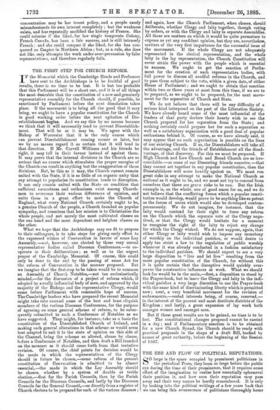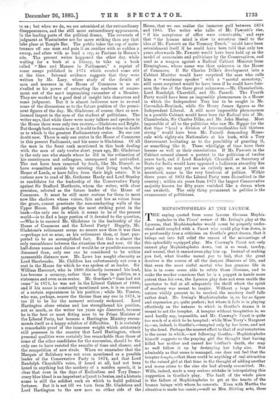THE EBB AND FLOW OF POLITICAL REPUTATIONS.
SO large is the space occupied by prominent politicians in the periodical Press, they loom so large before the public eye during the time of their prominence, that it requires some effort of the imagination to realise how essentially ephemeral their position is, and how soon their reputation may pass away and their very names be hardly remembered. It is only by looking into the political writings of a few years back that we can bring this evanescence of politicians thoroughly home
to us ; but when we do, we are astonished at the extraordinary disappearances, and the still more extraordinary appearances, in the leading parts of the political drama. The reversals of judgment at Westminster are far more striking than any that take place at Temple Bar. The public takes the cap of main- tenance off one man and puts it on another with as sudden a swoop, and often with as loud a cry, as Fortune in Horace's ode. The present writer happened the other day, while waiting for a book at a library, to take up a book called "Men and Manner in Parliament," a reprint of some essays published in 1874 which created some stir at the time. Internal evidence suggests that they were written by Mr. Lucy, whose study of the details of men and manners in the House of Commons is as un- rivalled as his power of extracting the sunbeam of amuse- ment out of the most unpromising cucumber of a Member. They are marked by a good deal of insight into characters and some judgment. But it is almost ludicrous now to re-read some of the discussions as to the future position of the promi- nent figures of the day. Mr. Gladstone, of course, then as now, loomed largest in the eyes of the student of politicians. The writer says, that while there were many talkers and speakers in the House there were only two orators,—Gladstone and Bright. But though both remain to us, it is odd to find the writer in doubt as to which is the greatest Parliamentary orator. No one can doubt now. There is only one orator in the House of Commons in this present Parliament, and his name is Gladstone. Of all the men in the front rank mentioned in this book dealing with the men of only twelve short years ago, Mr. Gladstone is the only one who stands where he did in the estimation of his countrymen and colleagues, unsurpassed and unrivalled. The rest have been removed by death, like Mr. Disraeli, or have committed suicide by entering that living tomb, the House of Lords, or have fallen from their high estate. It is curious now to read of Mr. Gathome Hardy and Lord Stanley as candidates for the leadership of the Conservative Party against Sir Stafford Northeote, whom the writer, with clear precision, selected as the future leader of the House of Commons. It must be still more curious for them to meet now like shadows whose voices, thin and low as voices from the grave, cannot penetrate the non-conducting walls of the Upper House. But perhaps the most striking point in the book—the only one in which it seems to be of the present world—is to find a large portion of it devoted to the question, —Who is to succeed Mr. Gladstone in the leadership of the House of Commons and the Liberal Party/ Happily, Mr. Gladstone's retirement seems no nearer now than it was then —perhaps not so near, as his retirement then, at least, pur- ported to be an accomplished fact. But this is almost the only resemblance between the situation then and now. Of the half-dozen names and claims of would-be or possible successors discussed then, only one can be considered to be within measurable distance now. Mr. Lowe has sought obscurity as Lord Sherbrooke. Mr. Childers has unfortunately not even a seat in the House for whish he was spoken of as leader. Sir "William Harcourt, who in 1880 distinctly increased his lead, has become a memory, rather than a hope in politics, as a statesman and even as an orator. Mr. Goschen's " time had not come" in 1874, he was not in the Liberal Cabinet of 1880, and if his name is constantly mentioned now, it is on account of a certain separateness in his position ; while Mr. Forster, who was, perhaps, nearer the throne than any one in 1874, is too ill to be for the moment seriously reckoned. Lord Hartington alone retains and has strengthened his position, not so much, as the writer ten years ago discerned, because he is the best or most fitting man to be Prime Minister of the Liberal Party, but because a Hartington Ministry recom- mends itself as a happy solution of difficulties. It is certainly a remarkable proof of the immense weight which aristocracy still possesses in the country that Lord Hartington, whose personal qualities were certainly less remarkable than those of some of the other candidates for the succession, should be the only one to have resisted the assaults of time and chance, and the competition of new rivals. When we remember that the Marquis of Salisbury was not even mentioned as a possible leader of the Conservative Party in 1874, and that Lord Randolph Churchill's voice, if heard at all, had not been beard in anything but the modesty of a maiden speech, it is clear that even in the days of Radicalism and Tory Demo- cracy blue blood is an important adjunct to brains, and a historic name is still the solidest rock on which to build political fortunes. But it is not till we turn from Mr. Gladstone and Lord Hartington to the new men on either side of the House, that we can realise the immense gulf between 1874 and 1885. The writer who talks of Mr. Fawcett's rise, "if his acceptance of office were conceivable," and says that "the human mind is slow to accustom itself to the idea of Mr. Fawcett on the Treasury Bench," would have been astonishment itself if he could have been told that only ten years afterwards Mr. Fawcett would have been held up as the model of economists and politicians by the Conservatives, and used as a weapon against a Radical Cabinet Minister from Birmingham, whose name was then unknown in the House of Commons. If Sir Charles Dilke's development into a Cabinet Minister would have surprised the man who calls him a "wearisome speaker" with a "mortal monotony," still more surprised would he have been if he could have fore- seen the rise of the three great unknowns,—Mr. Chamberlain, Lord Randolph Churchill, and Mr. Parnell. The Fourth Party would have been an impossible phenomenon in a House in which the Independent Tory has to be sought in Mr. Cavendish-Bentinck, while Sir Henry James figures as the Independent Liberal. A still more impossible phenomenon in a possible Cabinet would have been the Radical trio of Mr. Chamberlain, Sir Charles Dilke, and Mr. John Morley. Most impossible of all to the politician who saw Mr. Biggar for the first time "head a division of Irreconcileables full thirteen strong" would have been Mr. Parnell demanding Home- rule with eighty-six Nationalists at his back, with a Tory Government hesitating as to the possibility of granting it, or something like it. These whirligigs of time have their lessons as well as their consolations. If Mr. Fawcett in the Cabinet seemed almost a portent to the politician of twelve years back, and if Lord Randolph Churchill as Secretary of State for India would have appeared a ludicrous absurdity five years ago, we may yet see an entirely new, or at least an unnoticed, name in the very forefront of polities. Within three years of 1832 the Liberal Party were discredited in the country ; within six years from 1874 the largest Conservative majority known for fifty years vanished like a dream when one awaketh. The only thing permanent in politics is the evanescence of politicians.



































 Previous page
Previous page